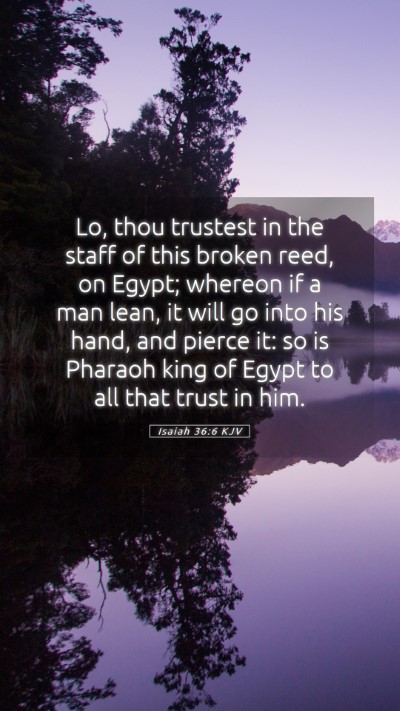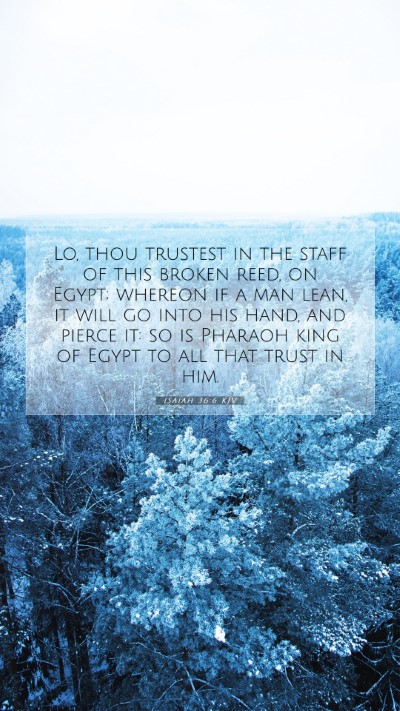Understanding Isaiah 36:6
Isaiah 36:6 states:
"Lo, thou trustest in the staff of this broken reed, on Egypt; whereon if a man lean, it will go into his hand, and pierce it: so is Pharaoh king of Egypt unto all that trust in him."
Bible Verse Meaning
The verse from Isaiah highlights the futility of placing trust in worldly alliances, specifically pointing to Egypt as a metaphor for unreliable support. The term "broken reed" illustrates that any reliance on Egypt, representing political and military alliances, is inherently unstable and dangerous.
Bible Verse Interpretations
- Matthew Henry's Commentary:
Henry emphasizes the transitory nature of worldly supports, making clear that while Israel might consider turning to Egypt for help, such reliance is misguided. He reflects on the attributes of trust that should be reserved for God alone, arguing that Egypt is not a refuge but a liability.
- Albert Barnes' Commentary:
Barnes discusses the historical context, indicating that at the time of Isaiah, Israel was facing a crisis and was tempted to lean on Egypt for military aid. He elaborates on the symbolism of the "broken reed," arguing that Egypt could not provide the salvation Israel sought, highlighting the importance of trusting in God's strength rather than human power.
- Adam Clarke's Commentary:
Clarke furthers the discussion by highlighting the metaphor’s implications; he notes that a reed, while seeming solid, is weak and prone to break. His analysis draws attention to the dangers of misplaced trust, suggesting that those who rely on humans instead of God will ultimately be harmed.
Biblical Exegesis and Commentary
This passage serves as a warning against reliance on worldly powers. Isaiah’s sharp imagery of a “broken reed” poignantly illustrates the dangers of trusting in Egypt, which, although powerful, is ultimately unreliable. The cross-reference to 2 Kings 18:21 reinforces this theme—a reminder that alliances with nations other than God do not provide the security one hopes for.
Historic Context of Isaiah 36:6
Understanding the situational backdrop is crucial for interpreting this verse. During the reign of King Hezekiah, Assyria was threatening Israel, and the people faced tremendous pressure to seek help from Egypt. Isaiah's message serves to reorient them to a focus on divine protection rather than human alliances.
Application of Isaiah 36:6 to Daily Life
This verse invites a reflection on where one places trust. In modern terms, it encourages believers to consider if they are leaning too heavily on societal supports—such as media, economics, or political figures—rather than seeking guidance and strength from God. Proper application of this verse can transform personal and communal decision-making, encouraging reliance on faith.
Related Cross References
- 2 Kings 18:21 - Discusses the futility of relying on Egypt.
- Isaiah 30:1-3 - Warns against seeking help from Egypt.
- Psalms 118:8-9 - Highlights the importance of trust in the Lord over men.
Bible Study Insights
The insights that arise from Isaiah 36:6 can greatly benefit individual and group Bible studies. Utilizing online Bible study resources can facilitate discussions about the importance of understanding scripture and provide tools for Bible study lessons focused on the importance of reliance on God. Additionally, examining the historical context of Bible verses enriches the interpretation and engages individuals in in-depth Bible verse analysis.
Conclusion
In sum, Isaiah 36:6 is a profound reminder of the instability of worldly alliances and the inherent risks in trusting human power over divine strength. This scripture serves not only as historical insight but engages modern listeners in a deeply relevant dialogue about their sources of strength and security.


